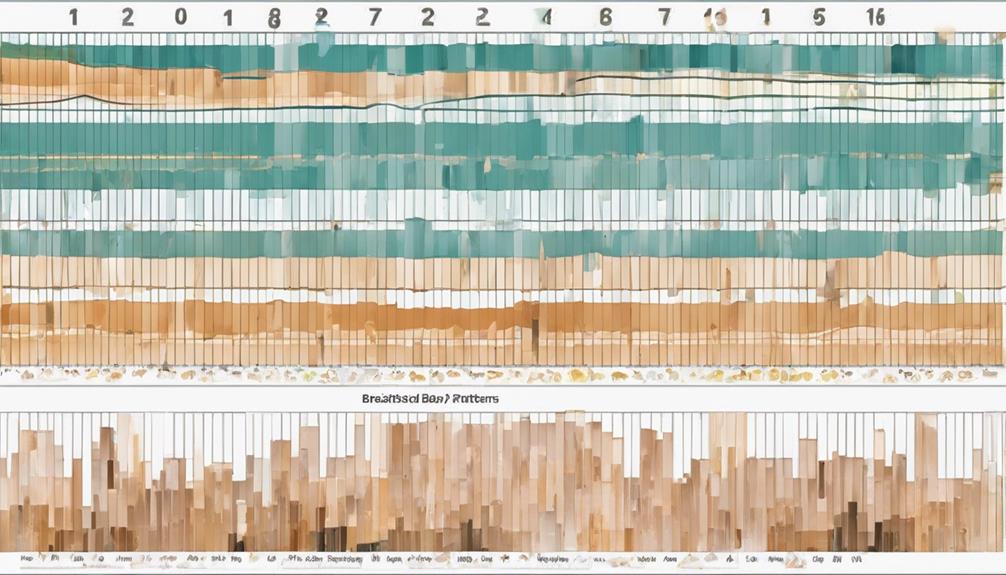As parents, we often wonder about our newborn's bowel habits, questioning if what we observe is within the scope of normalcy. Have you ever found yourself counting the number of times your little one poops in a day, unsure if it aligns with expectations?
Understanding the frequency and characteristics of your baby's poop can provide valuable insights into their health and well-being. Let's navigate through the intricacies of newborn poop patterns and expose the significance behind their daily movements.
Key Takeaways
- Newborn poop frequency varies: 2-5 times/day for babies under 6 weeks.
- Breastfed babies may poop up to 6 times/day with mustard-yellow, seedy poop.
- Formula-fed babies have 1-4 bowel movements/day with firmer, yellow to brown stools.
- Monitor poop color, consistency, and frequency for signs of concern or dehydration.
Newborn Poop Frequency Overview
Newborns typically pass meconium in the first 24-48 hours after birth, marking the beginning of their digestive journey. As a new parent, understanding your baby's bowel movements is important.
Babies under 6 weeks old usually have frequent poops, ranging from 2-5 times a day. If your little one is breastfed, they might even have up to 6 bowel movements daily during those initial weeks. On the other hand, formula-fed babies tend to poop slightly less, averaging around 1-4 times a day.
While poop frequency can vary, it's crucial to pay close attention to the color and consistency. Healthy newborn poop is typically mustard yellow and seedy for breastfed babies, and tan or yellow for formula-fed infants. Any significant deviations in color or texture should be discussed with your pediatrician to make sure your baby is thriving as they should.
Monitoring these aspects will help you track your baby's health and development effectively.
Breastfed Baby Poop Patterns

Understanding the typical poop patterns of breastfed babies can provide valuable insights into their digestive health and development during the initial weeks of life.
Here are some key points to consider regarding breastfed baby poop patterns:
- Frequency: Breastfed newborns often have bowel movements after each nursing session, which can total up to six or more times a day in the first six weeks of life.
- Appearance: Breastfed baby poop is typically mustard-yellow in color and has a seedy texture. This consistency is a result of the absorption of breast milk solids and is considered normal for breastfed infants.
- Development: As a breastfed baby's intestines mature around 6-8 weeks of age, the frequency of bowel movements usually decreases. However, variations in poop consistency can occur due to changes in breastfeeding patterns and diet transitions.
Understanding these breastfed baby poop patterns can help caregivers track their newborn's health and ensure they're thriving during this critical stage of development.
Formula-Fed Baby Poop Patterns
When caring for formula-fed infants, it's important to observe their poop patterns to guarantee their digestive health and overall well-being. Formula-fed babies typically have 1-4 bowel movements a day, producing fewer but larger stools compared to breastfed babies. The stool consistency for formula-fed infants is firmer, usually ranging from yellow to brown in color, ideally not firmer than peanut butter.
Monitoring changes in poop frequency is vital as it can indicate underlying issues. If you notice any abnormal stool patterns, consulting a pediatrician is recommended to make sure the baby's health. By staying attentive to your formula-fed newborn's poop patterns, you can quickly identify any deviations from the norm and take appropriate action.
Signs of Concern in Newborn Poop

What signs of concern should parents look out for in their newborn's poop?
- Red or Black Poop: If you notice red or black poop in your newborn's diaper, it could be a cause for concern and may indicate potential health issues. It's vital to seek medical advice promptly to rule out any serious conditions.
- Changes in Consistency: Keep an eye out for changes in poop consistency, such as watery, mucus-like, or hard stools. These variations could signal underlying problems that require medical attention to guarantee your baby's health and well-being.
- Signs of Dehydration: Be vigilant for signs of dehydration in your newborn, like dry mouth, sunken fontanelle, or reduced urine output. If you observe any of these symptoms, seek immediate medical intervention to prevent complications.
If your newborn experiences distress, discomfort, or unusual behaviors during bowel movements, it's imperative to consult a pediatrician for guidance and assessment to address any issues promptly. Your baby's health is a top priority, and staying attentive to these signs can help assure their well-being.
Consulting a Healthcare Provider
If your newborn's poop shows any concerning signs mentioned earlier, promptly consulting a healthcare provider is essential for ensuring your baby's well-being and addressing any potential issues. As parents, it's natural to worry about changes in your newborn's bowel movements. Trust your parental instincts and seek medical help if needed. Here is a helpful table to emphasize the importance of seeking medical advice when it comes to your baby's poop:
| When to Consult a Healthcare Provider |
|---|
| Newborn doesn't poop within 48 hours after birth |
| Changes in poop frequency or consistency |
| Signs of dehydration or irregular poop patterns |
Frequently Asked Questions
How Many Poop per Day Is Normal for Newborn?
It is understood that every baby is unique, but typically, newborns poop 2-5 times a day. Breastfed babies often go more frequently. Monitoring dirty diapers helps track this. Remember, it's normal for babies to pass meconium in the first day or two.
How Often Should a Newborn Poop Chart?
I comprehend the concern about newborns' poop frequency. It varies widely, from several times a day to once a week, depending on feeding method and baby's digestion. Remember, every baby is unique; consult your pediatrician if worried.
How Many Times a Day Should a Newborn Poop on Formula?
We typically see formula-fed newborns poop 1-4 times daily, but it can vary. Their poop is firmer than breastfed babies. If you notice changes in color, consistency, or frequency, consult a pediatrician for guidance.
How Long Can Newborns Go Without Pooping?
As new parents, we comprehend the concern about newborns not pooping. Remember, breastfed babies can go up to 4 days without a bowel movement, while formula-fed infants usually go daily. If worried, contacting a healthcare provider for guidance is essential.
Conclusion
Just as a baby's poop signals their health and nutrition, the frequency and consistency of their bowel movements serve as a roadmap for their well-being.
Like the changing seasons, the patterns of a newborn's poop can guide us through the journey of parenthood, providing insights into their growth and development.
By monitoring these subtle signs, we can navigate the path of caring for our little ones with confidence and understanding.










